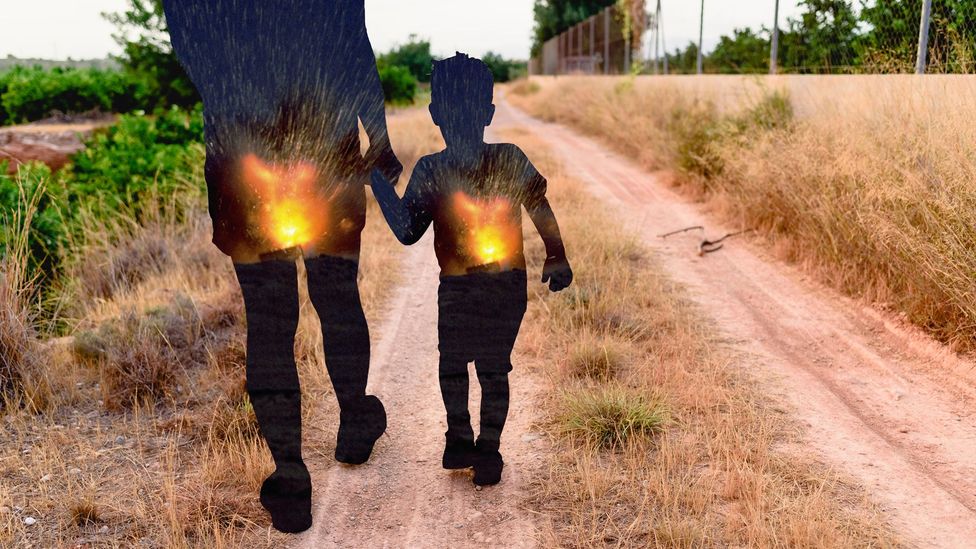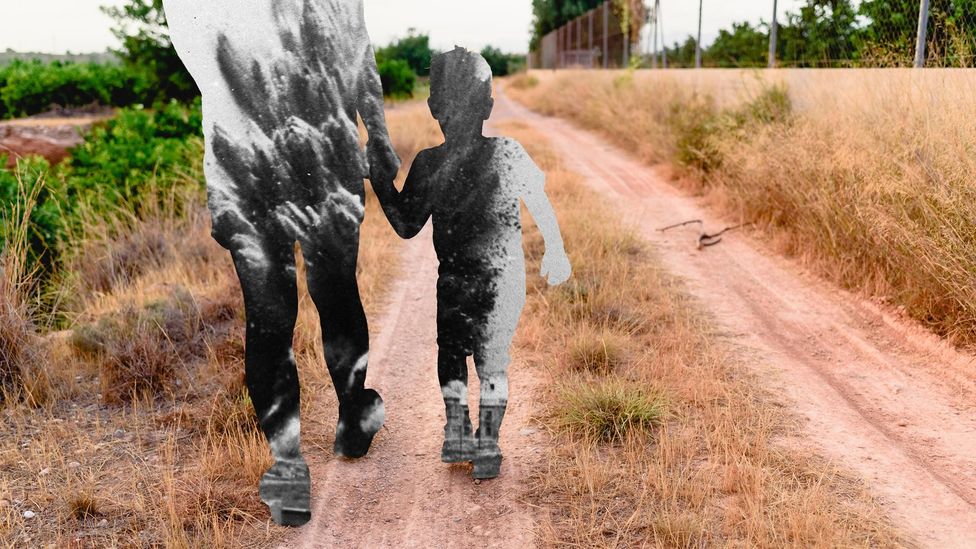What Is the Liquid That Comes Out When Babies Are Born Called
Can the legacy of trauma be passed downwardly the generations?
(Image credit:
Alamy/Getty Images/BBC
)

Our children and grandchildren are shaped by the genes they inherit from united states, but new enquiry is revealing that experiences of hardship or violence can leave their mark also.
I
In 1864, nearing the stop of the US Ceremonious State of war, atmospheric condition in the Confederate pow camps were at their worst. There was such overcrowding in some camps that the prisoners, Union Ground forces soldiers from the north, each had the square footage of a grave. Prisoner death rates soared.
For those who survived, the harrowing experiences marked many of them for life. They returned to club with impaired health, worse job prospects and shorter life expectancy. But the impact of these hardships did not end with those who experienced information technology. It as well had an result on the prisoners' children and grandchildren, which appeared to be passed downwardly the male line of families.
While their sons and grandsons had not suffered the hardships of the PoW camps – and if anything were well provided for through their childhoods – they suffered higher rates of mortality than the wider population. Information technology appeared the PoWs had passed on some chemical element of their trauma to their offspring.
You might besides similar:
• What happens when the food runs out?
• Wet countries that are running dry
• Why more men take their ain lives
But dissimilar most inherited conditions, this was non caused past mutations to the genetic code itself. Instead, the researchers were investigating a much more obscure type of inheritance: how events in someone'due south lifetime can change the fashion their Dna is expressed, and how that modify can exist passed on to the next generation.
This is the process of epigenetics, where the readability, or expression, of genes is modified without irresolute the DNA code itself. Tiny chemical tags are added to or removed from our Deoxyribonucleic acid in response to changes in the environment in which we are living. These tags plough genes on or off, offering a way of adapting to changing conditions without inflicting a more permanent shift in our genomes.

The effects of trauma may echo down several generations, from a grandfather to their son and so to their grandson (Credit: Alamy/Getty Images/BBC)
But if these epigenetic changes acquired during life can indeed also be passed on to later generations, the implications would be huge. Your experiences during your lifetime – peculiarly traumatic ones – would have a very real impact on your family for generations to come. In that location are a growing number of studies that support the thought that the effects of trauma can reverberate down the generations through epigenetics.
For the PoWs in the Confederate camps, these epigenetic changes were a upshot of the extreme overcrowding, poor sanitation and malnutrition. The men had to survive on small rations of corn, and many died from diarrhoea and scurvy.
"There is this menstruum of intense starvation," says study author Dora Costa, an economist at the University of California, Los Angeles. "The men were reduced to walking skeletons."
Costa and her colleagues studied the health records of about 4,600 children whose fathers had been PoWs, comparison them to just over 15,300 children of veterans of the war who had not been captured.
The sons of PoWs had an 11% college mortality rate than the sons of non-Pow veterans. Other factors such as the male parent's socioeconomic condition and the son's job and marital status couldn't account for the college mortality rate, the researchers found.
This excess mortality was mainly due to higher rates of cognitive bleeding. The sons of PoW veterans were also slightly more probable to die from cancer. Simply the daughters of quondam PoWs appeared to be allowed to these furnishings.
This unusual sex-linked pattern was 1 of the reasons that fabricated Costa suspect that these health differences were acquired by epigenetic changes. Only first Costa and her squad had to rule out that it was a genetic event.

For some reason, the trauma seem to be most strongly passed from fathers to their sons (Credit: Alamy/Getty Images/BBC)
"What could take happened is that a genetic trait which enabled the begetter to survive the campsite, a tendency toward obesity for instance, was and then bad during normal times," says Costa. "Notwithstanding, if you lot await within families, there are but furnishings among sons born after but not before the war."
If it were a genetic trait and then children born earlier and after the state of war would exist equally likely to testify the reduced life expectancy. With a genetic crusade ruled out, the about plausible explanation left was an epigenetic upshot.
"The hypothesis is that in that location'due south an epigenetic effect on the Y chromosome," says Costa. This effect is consistent with studies in remote Swedish villages, where shortages in food supply had a generational effect down the male line, but not the female person line.
But what if this increased chance of death was due to a legacy of the father's trauma that had naught to exercise with DNA? What if traumatised fathers were more likely to corruption their children, leading to long-term health consequences, and sons bore the brunt of information technology more than daughters?
Once over again, comparing the health of children inside families helped rule this out. Children born to men before they became PoWs didn't have a spike in bloodshed. Simply the sons of the aforementioned men after their Pw camp experience did.
"Information technology's a case of ruling out the other possible options," says Costa. "A lot of it is proof past elimination and what is the virtually consequent explanation."
Many of the times when trauma is thought to have echoed downwardly the generations via epigenetics in humans are linked to the darkest moments in history. Wars, famines and genocides are all thought to have left an epigenetic mark on the descendants of those who suffered them.

An epigenetic betoken in the children of people who have survived traumatic experiences raises hopes of reversing the effect it has on their DNA (Credit: Alamy/Getty Images/BBC)
Some studies have proved more controversial than others. A 2015 study found that the children of the survivors of the Holocaust had epigenetic changes to a gene that was linked to their levels of cortisol, a hormone involved in the stress response.
"The idea of a signal, an epigenetic finding that is in offspring of trauma survivors tin mean a lot of things," says Rachel Yehuda, director of the Traumatic Stress Studies Division at the Mount Sinai School of Medicine and an author of the study. "It'due south heady that information technology's in that location."
The report was small, assessing just 32 Holocaust survivors and a full of 22 of their children, with a pocket-sized control group. Researchers have criticised the conclusions of the study. Without looking at several generations and searching more widely in the genome, nosotros can't exist certain information technology is really epigenetic inheritance.
Yehuda acknowledges that the newspaper was blown out of proportion in some reports, and larger studies assessing several generations would be needed depict firm conclusions.
"It was 1 single pocket-size study, a cross-section of adults many, many years later on parental trauma. The fact we got a hint was large news," says Yehuda. "Now the question is, how do yous put meat on the bones? How exercise you actually sympathize the mechanism of what is happening?"
Controlled experiments in mice have allowed researchers to hone in on this question. A 2013 written report found that there was an intergenerational effect of trauma associated with scent. The researchers blew acetophenone – which has the scent of cherry flower – through the cages of adult male mice, zapping their foot with an electrical current at the same fourth dimension. Over several repetitions, the mice associated the smell of ruddy blossom with pain.

The idea that the consequence of a traumatic experience might be passed from a parent to their offspring is yet regarded as controversial past many (Credit: Alamy/Getty Images/BBC)
Shortly afterwards, these males bred with female mice. When their pups smelled the scent of carmine blossom, they became more jumpy and nervous than pups whose fathers hadn't been conditioned to fright it. To dominion out that the pups were somehow learning almost the smell from their parents, they were raised by unrelated mice who had never smelt cherry blossom.
The grandpups of the traumatised males also showed heightened sensitivity to the scent. Neither of the generations showed a greater sensitivity to smells other than cherry bloom, indicating that the inheritance was specific to that aroma.
This sensitivity to cherry blossom odour was linked back to epigenetic modifications in their sperm DNA. Chemical markers on their DNA were plant on a gene encoding a smell receptor, expressed in the olfactory bulb between the nose and the brain, which is involved in sensing the ruddy blossom scent. When the team dissected the pups' brains they also found at that place was a greater number of the neurons that detect the scarlet blossom scent, compared with control mice.
The second and third generation appeared to have not a fear of the scent itself, but a heightened sensitivity to it. The finding brings to light an often-missed subtlety of epigenetic inheritance – that the adjacent generation doesn't always prove exactly the same trait that their parents adult. It is non that fright is being passed downward the generations – information technology is that fear of a scent in 1 generation leads to sensitivity to the same odour in the next.
"Then this is non 'apples for apples'," says Brian Dias, writer of the study and a researcher at Emory University and the Yerkes National Primate Research Centre in the U.s.a.. Fifty-fifty the term "inheritance" should be qualified here, he adds. "The word inheritance suggests information technology has to be a faithful representation of a trait that'due south passed down."
The consequences of passing down the effects of trauma are huge, even if they are subtly altered betwixt generations. It would change the way nosotros view how our lives in the context of our parents' experience, influencing our physiology and even our mental health.

The offspring of mice condititioned to fear the smell of flowers would also be sensitive to the same scent (Credit: Alamy/Getty Images/BBC)
And knowing that the consequences of our own actions and experiences now could affect the lives of our children – even long before they might be conceived – could put a very different spin on how nosotros choose to live.
Despite picking upwards these echoes of trauma downwards the generations, there is a big stumbling block with enquiry into epigenetic inheritance: no one is sure how it happens. Some scientists think that information technology is actually a very rare event.
One of the reasons that information technology may not be widespread is that the vast majority of one type of epigenetic mark on the DNA – the addition of a clump of chemicals known every bit methylation – is wiped clean at the very start of life and the procedure of adding these chemical groups to the DNA begins almost from scratch.
"As before long every bit the sperm enters the egg in a mammal, in that location'south a rapid loss of DNA methylation from the paternal set up of chromosomes," says Anne Ferguson-Smith, a researcher studying epigenetics at the Academy of Cambridge. "That's the reason why transgenerational epigenetic inheritance is such a surprise.
"It's very hard to imagine how you could have epigenetic inheritance when at that place's a process of removal of all the epigenetic marks and putting on new ones in the next generation."
There are, nevertheless, parts of the genome that are not wiped clean. A process chosen genomic imprinting protects the methylation at specific points of the genome. Just these sites are not the ones where the epigenetic changes relevant to trauma are found.
A recent study by Ferguson-Smith's group suggests epigenetic inheritance is probably very rare in mice.

Epigenetics is idea to be the link betwixt nature and nurture, where a person's experiences alters how their Deoxyribonucleic acid is read past their cells (Credit: Alamy/Getty Images/BBC)
But other researchers are convinced that they have plant the hallmarks of epigenetic inheritance for several traits – in humans also every bit animals. What's more, they recollect they've found a mechanism for how it works. This time information technology could be molecules similar to Dna – known as RNA – that are altering how genes function.
A recent paper has revealed strong evidence that RNA may play a role in how the effects of trauma can be inherited. Researchers examined how trauma early in life could be passed on past taking mouse pups abroad from their mothers right afterward birth.
"Our model is quite unique," says Isabelle Mansuy of the University of Zürich and ETH Zürich, who led the inquiry. "Information technology'southward to mimic confused families, or the abuse, neglect and emotional damage that you sometimes see in people."
The symptoms these pups showed as they grew upwardly also mimicked the symptoms seen in children who have experienced early trauma. The mice showed signs of increased gamble-taking and higher calorie intake, both seen in child trauma survivors. When the males grew upward, they had pups that showed similar traits – overeating, hazard taking and higher levels of antisocial behaviour.
The researchers extracted RNA molecules from the sperm of male mice who had been traumatised and injected these molecules into early the embryos of mice whose parents had not experienced this early-life trauma. The resulting pups, withal, showed the typical altered behavioural patterns of a pup whose parents experienced trauma.
They as well found that unlike lengths of RNA molecules were linked to different behavioural patterns: longer RNAs corresponded to greater nutrient intake, changed the torso'southward response to insulin and greater risk-taking. Smaller RNA molecules were linked to showing signs of despair.
"It'due south the first time we've seen this link in a causal way," says Mansuy.

It is possible that emotional damage experienced in your own babyhood could be passed on to your children (Credit: Alamy/Getty Images/BBC)
How these RNA molecules alter the behaviour of multiple generations is not yet known. Mansuy is at present running experiments in humans to come across if similar processes are at work in humans. Initial experiments past other researchers have shown that this does seem to exist the case in men.
This research – as well every bit many of the mice studies – focus on sperm and epigenetic inheritance down the male line. This isn't considering scientists think it only happens in males. It'due south but a lot harder to written report eggs than it is to written report sperm.
But efforts to decipher epigenetic inheritance down the female line is the next step.
"We had to kickoff from somewhere," says Mansuy. "Only we are looking to have a model of trauma that shows how inheritance occurs via both females and males."
There are other known kinds of epigenetic mechanisms that are relatively little studied. 1 of them is called histone modification, where the proteins that act as a scaffold for Deoxyribonucleic acid are chemically tagged. Now research is starting to suggest that histones could besides be involved in epigenetic inheritance through the generations in mammals.
"I suspect the answer is that all of these mechanisms could interact to give us the phenomenon that is intergenerational inheritance of acquired traits," says Dias.
The science of epigenetic inheritance of the effects of trauma is young, which means it is still generating heated debate. For Yehuda, who did pioneering piece of work on Post-Traumatic Stress Disorder in the 1990s, this comes with a sense of déjà vu.

Exactly how trauma is passed downwardly through the generations is still unclear as the mechanisms that act on the Dna are not fully understood (Credit: Alamy/Getty Images/BBC)
"Where we are with epigenetics today feels like how it was when nosotros showtime started doing inquiry into PTSD," she says. "It was a controversial diagnosis. Not everyone believed in that location could be long term result of trauma."
About 30 years later, PTSD is a medically accepted condition that explains why the legacy of trauma can span decades in a person's lifetime.
Merely if trauma is shown to be passed downwards the generations in humans in the same manner every bit it appears to be in mice, we shouldn't experience a sense of inevitability about this inheritance, says Dias.
Using his blood-red blossom experiments in mice, he tested what would happen if males that feared the odor were later on desensitised to the smell. The mice were repeatedly exposed to the scent without receiving a foot stupor.
"The mouse hasn't forgotten, but a new association is being formed now this odor is no longer paired with the pes shock," says Dias.
When he looked at their sperm, they had lost their feature "fearful" epigenetic signature later the desensitisation process. The pups of these mice also no longer showed the heightened sensitivity to the smell. And so, information technology if a mouse "unlearns" the association of a scent and pain, so the next generation may escape the effects.
It as well suggests that if humans inherit trauma in similar ways, the effect on our DNA could be undone using techniques like cognitive behavioural therapy.
"There'due south a malleability to the organisation," says Dias. "The dice is non cast. For the most office, we are not messed up as a human race, even though trauma abounds in our environment."
At least in some cases, Dias says, healing the effects of trauma in our lifetimes can put a cease to it echoing farther downwardly the generations.
--
The artworks in this article were created by Javier Hirschfeld for the BBC.
Bring together 900,000+ Hereafter fans by liking us on Facebook , or follow us on Twitter or Instagram .
If you liked this story, sign upwardly for the weekly bbc.com features newsletter , called "If Y'all Only Read 6 Things This Week". A handpicked selection of stories from BBC Futurity, Civilisation, Capital, and Travel, delivered to your inbox every Friday.
What Is the Liquid That Comes Out When Babies Are Born Called
Source: https://www.bbc.com/future/article/20190326-what-is-epigenetics